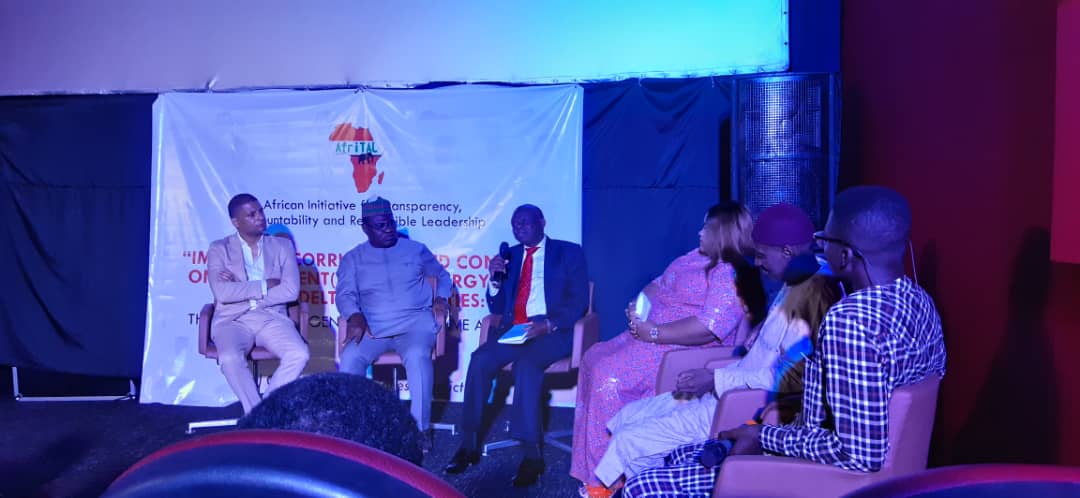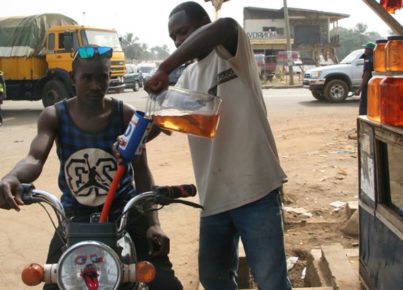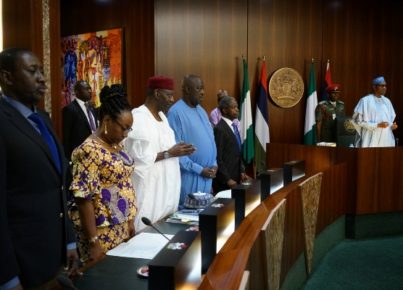A SYNOPSIS OF THE DOCUMENTARY SCREENING OF AUGUST 15, 2019
BY DR LOUIS BROWN OGBEIFUN
Experts in the oil and gas industry have advised that continuous advocacy by individuals and all stakeholders, is the panacea for eradicating corruption that stokes conflict in the extractive industry especially in the Niger Delta, bad policies and governance, lack of accountability and transparency in managing the oil and gas industry. They said that Nigerians, irrespective of their political divide must rise up and own the anti-corruption war beyond the lip service against the menace. Leaving the fight against corruption to the government would continue to accentuate the level of poverty in the oil rich States and Nigeria.
The experts spoke after a documentary screening on the “Impact of Corruption and Conflict on Investments, in the Energy Rich Niger Delta Communities’’. The Documentary screening was organized by the African Initiative for Transparency, Accountability and Responsible Leadership (AfriTAL); a Non-governmental Organization (NGO), at the Genesis Cinema, Central Business District Abuja, on Thursday 15th August 2019.
The convener of the Documentary screening, Dr Louis Brown Ogbeifun encouraged Nigerians to hold the government responsible and accountable for failure to providing social amenities, infrastructures, and encouraging pervasive corruption in high places, which has left the people poorer than they were in 2018. There are also individuals that have turned themselves into principalities and powers, which must be worshipped and consulted, without which no investment cannot prosper in the region. He said that the stakeholders have been brought together not to lament about our woes, but to seek solutions to the myriads of challenges besetting the oil and gas sector. He then emotionally asked: why is Nigeria still crawling in the world of crude, when other nations are already working towards providing energy outside of crude? Why has it been impossible to harness the hydrocarbon benefits to transforming Nigeria’s educational sector, health infrastructures and the provision of social amenities for the masses of this nation? Why is it that more than a decade ago, a country like Norway, had close to a trillion US dollars in her Sovereign Wealth Fund when Nigeria has less than 4 billion US dollars in hers in 2019? Why is it that Nigeria has not been able to latch on its hydrocarbon potentials to invest outside the shores of Nigeria like Saudi Arabia that owns one of the large refineries in the USA? Why is it that Nigeria despite her huge gas reserves, is virtually behind all the nations she started crude production with?
Introducing the documentary, Dr Tubondenyefa Zibima, said the documentary focused on two communities viz- Ogidigben and Gelegele in Delta and Edo States respectively. He noted that the two communities are oil bearing and had the following things in common:
- Many large capital investments that have been contemplated by the State in partnership with large foreign and local investors create/exacerbate a pathway to conflict (and often violence). Unfortunately, the investments just remain plans on the drawing board,
- Often, the emergence of conflict issues coincides with the project commitment between government or investors (specifically in planned project sites)
- The emergence of conflict follows similar trajectories and timelines, suggesting a high likelihood that this dynamic have become an integral part of the massive failure rate of such projects.
- This environment of conflict around oil and gas investments has been framed within the context of the interaction between three distinct clusters of actors namely the host communities; Government; and Private investors. The clusters of actors once thought were disconnected are however, connected. For instance, a community leader who is a conflict entrepreneur is a commissioner or an appointed/elected public official.
- Initial assessment around the conflicts in planned investment sites portray a third-party manipulation of the process of interaction amongst these actors for private accumulation of wealth at the detriment of the planned project and the community.
- That most of the community leaders nurture foot soldiers that front for them in stoking conflicts for pecuniary benefits instead of the collective interest of their communities;
- Niger delta is a functional conflict environment propelled by the forces of supply and demand with the suppliers and demand actors having enormous access to guns and power. These have turned to be conflict entrepreneurs found along the value chain.
- Stoking of legacy issues, land issues, sentiments with the sole aim of disarming the people of their commonwealth.
Mr. Charles Majomi an energy consultant, said the country is facing a huge catastrophe because of the leaders’ inability to effectively manage the oil and gas industry that would provide jobs for Nigerians. He noted that 70% of our oil and gas assets are onshore with 30% offshore. However, investors prefer investing in the offshore in order to avoid the local communities, thereby providing jobs for fewer people. He asserted that the massive exportation of our raw materials without an in-country value will not provide jobs for the teeming youths.
After the documentary, a panel of discussants was constituted to further shed light on the essence of the documentary.
Mrs. Faith Nwadishi, the Executive Director of Konyelum Imaala Foundation (KIF) and a key actor of Women in the Extractive Industry, commended those behind the documentary but lamented that the negative impacts of hydrocarbon activities on women and the roles they should play were not succinctly projected. She noted that women are the mothers and wives that bear the brunt of the harsh environmental impacts in the extractive industry. She used an analogy of how the oil companies drawing on the illiteracy of most rural women, lie to the women that the gas flare sites are veritable are effective ovens for drying their fishes.
She also drew a correlation between the research she carried out sometime ago, in which the only primary school in an oil and gas community, was a single room accommodating all the streams from primary 1 to 6. She lamented that it was sad to still see this parallel in 2019, when the children study in dilapidated facilities. She also gave knocks to government and the IOCs for not providing good health facilities, and potable water for the use of the people.
In her recommendation, she urged government and the stakeholders to:
- Involve women in the decision making process at all the levels of the oil and gas value chain,
- Incorporate women into the frameworks for conflict resolution,
- Investigate how conflict entrepreneurs influence the docility of women in effectively taking part in the Niger Delta.
Rev. Fr. Edward Obi, a catholic Priest, the Executive Director of GASIN and an environment activist, said that the style of governance adopted in the running of the Nigeria’s oil and gas sector, has sequestered the Government from the trest of the people. This he said, portends grave danger for the industry and the country as a whole. In his words, “We are in a country where people sit in their offices and make decisions that affect people without consulting them. It is a bad style of governance and it is seriously affecting the environmental regulation of the oil and gas industry” Speaking further, he said that government has never been transparent in the running of the oil and gas sector. In addition, the communities are not carried along nor enlightened on government plans for them. He said that in enunciating policies, government should not forget that human lives are highly impacted in the activities of oil and gas value chain. As a panacea, he recommended as follows:
- Government should consider the use of alternative voices that the people listen to. For instance, he noted that there is no community without a place of religious worship, which the people respect and listen to and this cuts across all religions and zones. Therefore, such places can become centers that could be used to enlighten the people on government programmes and at the end make them agents of change. It is when the people understand all what government wants to do, explain reasons for the projects planned for them, the benefits to the community and the people, that they would become receptive to the projects and also cooperate in delivering the projects.
- He appealed to the Government to always see Civil Society Organizations as partners instead of seeing and treating them as adversaries.
Dr Solomon Adeleye, on his part, said that corruption in Nigeria has been erroneously believed to affect only government and governance. The researchers identified nepotism, favoritism, political corruption, fraud, bribery as part of the larger corruption index. Whereas, corruption has been identified as one of the key factors affecting communities through stoking of conflicts and the bankability of projects in the Niger Delta. In his opinion, for government to turn the fortune of the country around, drive the growth and development to the height for employment generation, it must adopt a different approach in the management of the oil and gas sector activities. He said 25 per cent of Nigerians were unemployed, which will continue to grow exponentially with the three per cent population growth forecast. Therefore, efforts must be geared towards the creation of more jobs especially in the gas sector.
As a gas resource based nation, he recommended that there are areas that the government should focus as follows:
- Energy – Government should not use the same pattern of managing its crude oil to run the gas sector. It should use gas to drive its economic growth and development by creating mid-stream industries within the gas value chain.
- Employment – Create 6million jobs annually for the next ten years to meet up with the growing population, without which Nigeria is sitting on top of the gun powder
- Environment: Align with the socio-cultural needs of the host communities and make protection of the echo system a top priority.
- Engagement – Use the MCRIA tool for pre project analysis and engagement of the Host Community in order to have a sustainable development. Government must also use imbibe transparency and accountability in running the industry.
Dr Dahiru Moyi an Energy Consultant in his contribution, observed that the documentary was good but however, light in the content. He noted that one of the problems with Nigeria is not just that of the conflict entrepreneurs but that we are not homogenous. We have so many things dividing us as a nation that has led to our underdevelopment as against countries like Japan that has one religion, one language and one race. Now we can understand why there is no corruption in Japan.
Mr Charles Majomi, an energy consultant, said that Nigeria has lost its pride of place in the world of Oil and Gas. And no longer the oil and gas destination in Africa because oil had been discovered in many countries across the continent. America that used to be a major importer of our crude now produces oil. Ghana and Angola also have oil. So we are no longer the bride of old and no one is queuing behind us anymore. He therefore, recommended,
- Taking advocacy for accountability and transparency to government.
- Hold government accountable and ask what it does with our resources.
- Stakeholders should make input into the advocacy framework either through this platform or through online platforms
Opinions from the audience.
- We should not to make excuses for government.
- No single individual can be bigger than the government when it fails in its responsibilities.
- If a project has challenges because of nomenclature like the Gegelege sea port, then government should use a compound name e.g. Benin-Gelegele Sea Port.
- Organizers should appraise the documentary and add the missing links like interviewing, Government, the IOCs in order to have a balanced viewpoint
Recommendations
- Involve women in the decision making process at all the levels of the oil and gas value chain,
- Incorporate women into the frameworks for conflict resolution,
- Investigate how conflict entrepreneurs influence the docility of women in effectively taking part in the Niger Delta.
- Government must recognize the existence of conflict entrepreneurs and minimize their influence
- Oil producing communities must be reengaged immediately in a standardize format in order to revive stalled projects,
- Put in place a national industrialization plan that will engage the teeming engage the youths, increase jobs and provide social welfare benefits for the citizens,
- Use compound name for projects that have been stalled due to normenclature e.g. Benin-Gelegele Sea Port
- Hold government accountable and ask what it does with our resources.
- Desist from using the same pattern of managing its crude oil to run the gas sector. It should use gas to drive its economic growth and development by creating mid-stream industries within the gas value chain.
- Government should consider the use of alternative voices that the people listen to. For instance, there is no community without a place of religious worship, which the people respect and listen to and this cuts across all religions and zones. Therefore, such places can become centers that could be used to enlighten the people on government programmes and at the end make them agents of change. It is when the people understand all what government wants to do, reasons for the projects planned for them, the benefits to the community and the people, that they would become receptive to the projects and also cooperate in delivering the projects.
- Government should always see Civil Society Organizations as partners instead of seeing and treating them as adversaries.
- Create at least 6million jobs annually for the next ten years to meet up with the growing population, without which Nigeria is sitting on top of the gun powder
- Align with the socio-cultural needs of the host communities and make protection of the echo system a top priority.
- Use the MCRIA tool for pre project analysis and engagement of the Host Community in order to have a sustainable development. Government must also use imbibe transparency and accountability in running the industry.
- Government should be alive to its responsibilities, deal with the people in a more transparent and open manner.
- Organizers should appraise the documentary and add the missing links like interviewing, Government, the IOCs in order to have a balanced viewpoint,
- Make the documentary available on YouTube for larger viewership.












Pingback:TIME FOR COLLECTIVE ACTION AGAINST CORRUPTION AND CONFLICTS IN THE OIL AND GAS INDUSTRY - AfriTal